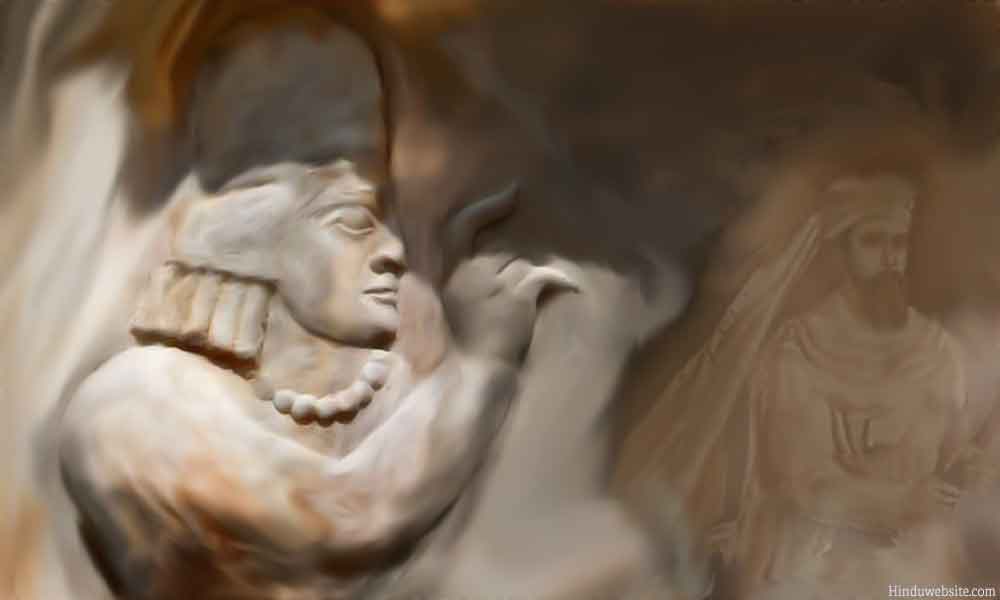
Zoroastrianism - Zoroastrian Priests

A Painting of Kartir, the high priest and vizier (“Moebed” in Pahlavi language) during the Sasanian rule
The priest of the good religion is considered wise among men; he keeps the Creator highly pleased and is most pious on account of his piety. - Denkard
In Zoroastrianism the priests go by different names, depending upon the tasks they perform. In ancient times there used be several types of priests, organized into a hierarchy, whose functions have been now either deemed unnecessary or combined into others.
To the highest category of priests belonged matharans, who like Zoroaster, were endowed with poetic ability and composed the verses of the sacred scriptures,
There were atharwans, who like the vedic atharvan priests, were associated with fire and haoma rituals.
A zaotar, like the hotr of the vedic religion, was an officiating or presiding priest of Yasna, who poured libations into the sacred fire to the accompaniment of ritual chants.
Magi or magu were a special class of priests endowed with occult knowledge, magical powers and power of divination. They also interpreted dreams and performed divinatory rituals to portend future. They were confined mostly to the western parts of ancient Iran and served in the courts of kings. Some of them wielded enormous political power and often came into conflict with the rulers they served.
Other classes of priests mentioned in the Zoroasrian texts, but relatively lesser known, were Kartirs or Mowbeds, Herbeds and Kirdars who existed at various times in the long and checkered history of the religion. The priesthood, as in vedic religion, is hereditary.
In the heydays of Zoroastrianism, the priests had the power to declare punishments or expiate the certain sins through purification rituals. the following verse from Denkdar declares the importance of a priest in cultivating virtue.
"The holy priest is the man to explain what is virtue; and by this explanation every soul has to lead a good life. Every man obtains from the Dastur the knowledge of what to do and what not to do. A man lives in the world without sin by not injuring virtuous men, and then the man obtains the love of God. All men not having the benefit of the Dastur's true knowledge about every thing, they do not possess the knowledge of God, religion and virtue. How can an ignorant man know of virtue without the aid of a religious teacher? Therefore every one amongst men has the need of a teacher of the salvation from sin and the acquisition of virtue." (Denakrd Bk.3-Chp339)
As in the Vedic society, the priestly class were considered to be superior in the society as is evident from the following verse
"The dignity of the head in the human body is (allotted) to the profession of Athornan; of the hand, to the profession Arthestar; of the belly, to the profession of Vastariush; and of feet, to the profession of Hutokhsh: thus, it is symbolically shown, that in rank and dignity, the profession of Athornan is as the head of the world; the profession of Arthestar is as the hands of the world; the profession of Vastariush is as the belly of the world; and, the profession of Hutokhsh is as the feet of the world. ( Denkard Bk.3-Chp.42)
Suggestions for Further Reading
- Zoroastrianism, Life After Death And The Nature of Heaven and Hell
- Zoroastrianism, The Battle Between Good and Evil
- Ahura Mazda Or Ohrmazd, the Zoroastrian God
- Amesha Spentas or Ameshaspands
- Asha, The Zoroastrian Concept of Truth and Universal Order
- Important Beliefs of Zoroastrianism
- The Old Iranian Calendars, Part 1
- Zoroastrianism - Main Concepts
- Zoroastrianism, Cosmogony Or Theories of Creation
- The Zoroastrian Cosmology
- Zoroastrinaism - The Zoroastrian Creed - An Overview
- Zoroastrianism - Genesis and Zoroastrian Calendar
- Zoroastrianism - Overview Of The Zoroastrian Doctrine
- Untitled 1
- Zoroastrianism - Important Zoroastrian or Parsi Festivals
- Funeral Ceremonies, Death and Disposal Of The Dead in Zoroastrianism
- Zoroastrianism - The Funeral Ceremonies of the Parsees, Part 1
- Gender Equality and Status Of Women In Zoroastrianism
- Zoroastrianism, On Good and Bad Religions
- The History of Zoroastrianism
- Asuras and Daevas the Indo Iranian Connection
- Zoroastrianism Links, Resources and Websites
- The Sacred Literature Of Zoroastrianism
- An Overview Of Zoroastrian Religion
- Important Practices of Zoroastrian Religion
- Zoroastrian Priests
- The Nature of Sin, Types of Sin and Expiation of Sin
- Space And Time In Zoroastrianism
- Life and works of Zarathushtra
- Zoroastrianism Main Beliefs
- Zarathushtra - Zoroaster
- Zoroastrianism, Zoroastrian, Links and Web Resources
- Zoroaster, Zarathushtra, Zarathustra
- Essays On Dharma
- Esoteric Mystic Hinduism
- Introduction to Hinduism
- Hindu Way of Life
- Essays On Karma
- Hindu Rites and Rituals
- The Origin of The Sanskrit Language
- Symbolism in Hinduism
- Essays on The Upanishads
- Concepts of Hinduism
- Essays on Atman
- Hindu Festivals
- Spiritual Practice
- Right Living
- Yoga of Sorrow
- Happiness
- Mental Health
- Concepts of Buddhism
- General Essays